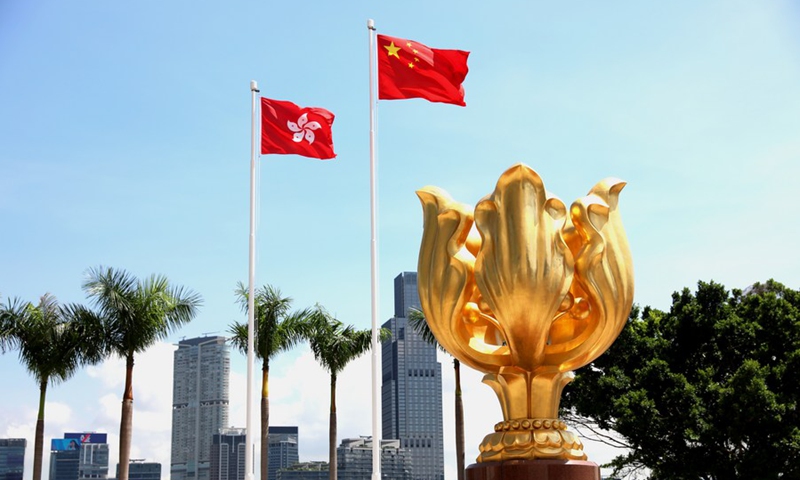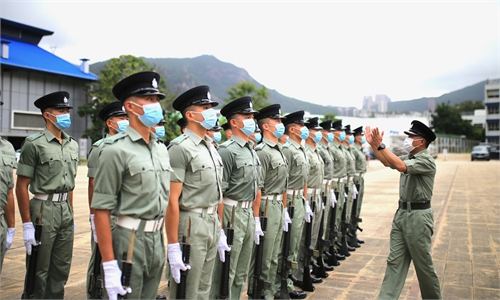
The Golden Bauhinia Square in south China's Hong Kong File photo: Xinhua
Chinese President Xi Jinping will be in the Hong Kong Special Administrative Region (SAR) on July 1 to commemorate the 25th anniversary of the handover of the city back to China. Previously, the territory had been under the British colonial rule for the span of over a century, following the Treaty of Nanjing that ended the first Opium War (1840-42).The visit comes amidst finger pointing from the West and its former colonial masters, who argue that the imposition of the National Security Law (NSL) in the city, starting in 2020, constitutes an attack on Hong Kong's "democracy and freedoms." This has led to constant posturing on the matter, including a recent mention of it in the G7 official joint statement by leaders, who continue to assume they have a direct stake in determining Hong Kong's future.
They do not. If there's one thing that should be understood about the National Security Law in Hong Kong, it is that it ultimately served to formally sever the city from its colonial past by helping extinguish the remnants of its old identity which brought the territory into violence and chaos.
In this aspect, the implementation of this law has not "taken it backwards" but ultimately affirmed a new stability and confidence in its future as a part of China, which returned to the country in 1997, constituted an act of justice in correcting a horrific historical wrong. China's sovereignty over the city is rightful, and the West is ultimately pushing an imperialist legacy of which it will never return to.
The British have never accepted that their colonial rule over Hong Kong ultimately constituted a crime against the Chinese people which opened up what was known as "the century of humiliation" against it, motivated by imperialist greed and exploitation. Instead, they view their legacy in the city with a form of pride, believing that they did a service to it and that they were motivated by altruism. It is never touched upon that during this time, Hong Kong residents were not given the liberty or democracy of which the mainland is now claimed to be taking away. They had no say in electing their British governors who were appointed from London. When locals revolted against the British in the 1960s, their protests were brutally suppressed with violence.
This rosy-eyed nostalgia and one-sided distortion of history towards Hong Kong leads British people and politicians to believe they still have a rightful "guardianship" over the city and that it is their "duty" to protect it from the country which they in fact rightfully handed it back to. The Sino-British Joint Declaration is not understood as a mutually agreed treaty between two parties, but is interpreted with the mindset of an "unequal treaty" of old wherein one side exclusively dictates and interprets the terms, and China is treated as a lesser partner to be restrained accordingly who ought not to have a proper say or influence in what is its own sovereign territory. This attitude constitutes a de-facto continuation of the colonial mindset. Britain and its allies seemingly "know what is best" for Hong Kong and its future, and Beijing has no right to a say.
However, the reality that Hong Kong is part of China cannot be changed, and the handover of 1997 marked that turning point, a rightful historical justice which corrected past wrongs. Yet, few seem to realize that even now. The NSL was not about "taking away democracy" or "oppressing" the territory, but ultimately securing rightful Chinese sovereignty over the city in the view to ending an explicitly Western backed insurrection of which brought chaos, violence and destruction to the city. The unrest was spurred on by the very colonial identity which Britain had articulated, the rendition that Hong Kong was something different and "exclusive" to China itself, which legitimated the politics of separatism and sedition. It is worth noting that whilst chastising China, Britain and the other countries of the West have little issue with jailing and silencing dissent when it constitutes a threat to the state.
Over the course of the past year, Britain has jailed dozens of climate protesters for disrupting public transport infrastructure (in a way far less violent than Hong Kong rioters did) and has approved the extradition of Julian Assange to the US. The UK of course will argue these were decisions impacting national security and sovereignty, but one might ask why does China not have such a right in Hong Kong? Why should the city be a playground for ideological crusading against the mainland, or Trojan horse politics in formulating insurrection and destruction? Since the imposition of NSL, the city is stable and flourishing again, even the BBC admits today that businesses refuse to give it up amidst constant hope of an "exodus".
Ultimately, the NSL stands as a turning point in dismantling the old colonial legacy of the city whilst nonetheless retaining its unique qualities and autonomy. The West can preach, lecture and moan about it, but there is no turning back the clock. The Sun has set on the British Empire, but now daylight shines on Hong Kong being stable, prosperous and integrated with the Chinese mainland again. The colonialists are on the wrong side of history, and the sooner they realize it the better.
The author is a political and historical relations analyst. opinion@globaltimes.com.cn


